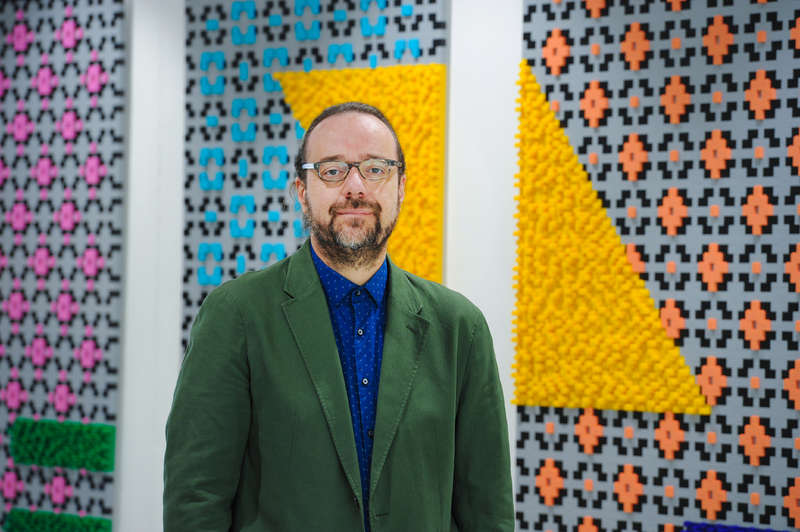UCT’s new eResearch director: Prof Vaccari
13 December 2022 | Story Maggie Marx. Photo Lerato Maduna. Read time 5 min.
Professor Mattia Vaccari, an astrophysicist by training, has joined the University of Cape Town (UCT) to take over the directorship of eResearch, a research support cluster that spans the Research Office, Libraries and ICTS. Vaccari brings with him knowledge and experience gained at the University of the Western Cape (UWC), South Africa, where he was the founding director of its eResearch office.
The nature of research and the spaces where it is developed, evaluated and shared has changed dramatically over the past two decades. To account for this dynamic landscape and in a response to a clear need, eResearch was established at UCT nearly 10 years ago.
Its mandate is wide in scope and always evolving: to support UCT researchers with the tools to store, analyse, manage, disseminate, and evaluate data and research.
For most of its lifespan, UCT eResearch has been led by Dr Dale Peters, who retired in 2020. Taking over the helm from September 2022 is Professor Mattia Vaccari. He brings with him a wealth of knowledge and experience from UWC where he established its eResearch office and served as its director for three years.
From 2019 to 2022, Vaccari was also the director of the ilifu cloud computing facility developed by the UCT-led Inter-University Institute for Data Intensive Astronomy (IDIA). It was through this position that he became familiar with many of his UCT colleagues.
“The role of eResearch director is a difficult one to fill, requiring insight into both the practice and the support and management of research across a range of specialist services,” says UCT Deputy Vice-Chancellor: Research & Internationalisation Professor Sue Harrison.
“I’m delighted that Professor Vaccari chose to join the UCT eResearch team, and I look forward to working with him to grow the eResearch support available to our researchers.”
The ilifu consortium is a demonstration of what we can achieve with relatively limited resources when eResearch infrastructure is developed by partners closely involved with the actual research work.
Ilifu – which means “cloud” in isiXhosa – is known to UCT researchers for its value as regional infrastructure for data-intensive research in astronomy and bioinformatics. In establishing ilifu in 2017, UCT partnered with the University of the Western Cape, Sol Plaatje University, the University of Stellenbosch, the Cape Peninsula University of Technology and the South African Radio Astronomy Observatory (SARAO).
“The ilifu consortium is a demonstration of what we can achieve with relatively limited resources when eResearch infrastructure is developed by partners closely involved with the actual research work,” says Vaccari. “This way we can more swiftly respond to researchers’ evolving needs and provide bespoke support to enable better, faster and higher-impact research.”
A career geared towards eResearch
Vaccari was born and raised in Montebelluna, Italy, and received his PhD from the University of Padua, Italy. After a few years as a research fellow at Imperial College London, United Kingdom, he returned to Padua to work as a research scientist until October 2011. The following month, he started as a senior research fellow at UWC where he spent the next decade contributing to astrophysics research by conducting extragalactic surveys carried out with MeerKAT and other radio telescopes, planning for the Square Kilometre Array (SKA), and carving the eResearch space in South Africa.
“During my PhD and the first few years after that working as a postdoctoral research fellow, I had the opportunity to be involved in the data analysis for astrophysics space missions run by NASA and the European Space Agency.
“This is when my interest in the different steps involved from building a scientific instrument to publishing research findings truly developed. It is an exciting field to be in and a challenging one, as not only the research enterprise but also our society at large is increasingly data-driven.”
Vaccari is clear about the road ahead for UCT eResearch.
“One of our main challenges going forward will be to ensure the democratisation of the digital skills and tools required in the world today – not only for every researcher to carry out impactful research but also to enable global citizens to make informed choices. Our data acquisition, processing, interpretation and visualisation services make eResearch a partner for UCT researchers and their global footprint of collaborators,” he says.
Vaccari is not all work and no play, though. His love for space developed with his studies and research and converges with his hobby of collecting and building Lego.
“Particularly their late ’70s and early ’80s Lego Space Classic line,” he specifies. “My collection is mostly back in Italy, but I've got some more modern Space and Sci-Fi large sets I plan to display in my office before too long.”
 This work is licensed under a Creative Commons Attribution-NoDerivatives 4.0 International License.
This work is licensed under a Creative Commons Attribution-NoDerivatives 4.0 International License.
Please view the republishing articles page for more information.
Research & innovation





































